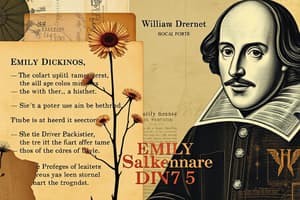Podcast
Questions and Answers
What is the central idea of the poem, and how does it relate to the concept of ownership?
What is the central idea of the poem, and how does it relate to the concept of ownership?
The central idea of the poem is that the past is always present, and that the people who have lived and died in a house continue to inhabit it. This relates to the concept of ownership by suggesting that the true owners of a house are not the current occupants, but the people who have lived there before, and that they continue to exert a claim on the property even after death.
What is the significance of the 'phantoms' in the poem, and how do they relate to the speaker's experience?
What is the significance of the 'phantoms' in the poem, and how do they relate to the speaker's experience?
The phantoms in the poem represent the lingering presence of the past, and the speaker's experience of encountering them is a testament to the enduring nature of human presence. The phantoms are described as 'harmless' and 'inoffensive', suggesting that they are not threatening, but rather a natural and inevitable part of the environment.
How does the poem use the idea of sight and perception to explore the relationship between the past and the present?
How does the poem use the idea of sight and perception to explore the relationship between the past and the present?
The poem uses the idea of sight and perception to highlight the difference between the speaker's experience and that of the stranger. The speaker sees and hears things that are not visible or audible to the stranger, suggesting that the past is only visible to those who are attuned to it. This contrast between the speaker's perception and the stranger's perception emphasizes the idea that the past is not just a memory, but a living and breathing presence.
What is the significance of the image of the 'dusty hands' and the 'old estates' in the poem?
What is the significance of the image of the 'dusty hands' and the 'old estates' in the poem?
How does the poem use the idea of the 'host' and the 'guest' to explore the relationship between the past and the present?
How does the poem use the idea of the 'host' and the 'guest' to explore the relationship between the past and the present?
Flashcards are hidden until you start studying
Study Notes
Haunted Houses
- All houses where people have lived and died are haunted by the memories of the past.
- The ghosts of former inhabitants are harmless and move silently, making no sound on the floors.
- These phantoms are active, going about their daily routines, but are invisible and inaudible to strangers.
The Presence of Ghosts
- The ghosts are felt throughout the house, on the stairs, and in the passages.
- They leave an impalpable impression on the air, making their presence known.
The Invisible Guests
- There are more guests at the table than the hosts have invited, but they are quiet and inoffensive.
- The ghosts are as silent as the pictures on the wall, but their presence is felt.
- The stranger at the fireside cannot see or hear the ghosts, but they are visible and clear to the one who knows.
Ownership and Mortmain
- We do not truly own the houses or lands we occupy, as they are still held by the owners and occupants of earlier dates.
- The ghosts of the past still hold their old estates, stretching out their dusty hands from forgotten graves.
Studying That Suits You
Use AI to generate personalized quizzes and flashcards to suit your learning preferences.




